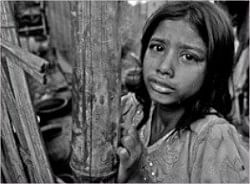Rights Corner
The invisibility of domestic workers
 |
Photo: facebook |
Many people who migrate for employment undergo very difficult situations. What is particularly striking about domestic workers is their invisibility. Once they come to the country, they disappear into people's homes.
Liesl Gerntholtz, the Director of the Women's Rights Division of Human Rights Watch, says one of the major problems they have found in their latest research (mainly in Asia and the Middle East) is that labor law does not recognize domestic workers as workers, so they are therefore not well protected.
"More typically we find that they don't have days off they are not paid properly, they are forced to work very long hours and in unhealthy conditions. In South Africa the law does apply to domestic workers. They are entitled to leave, a minimum wage, a number of protections all workers have. That is why I say South Africa is ahead of the curve we just hope they will take a leadership role on the convention. And encourage their allies to do the same."
In a very thorough and insightful report, HRW - who has been doing research on the issue of domestic workers for the last seven years - looked specifically at women who migrated from Cambodia, Indonesia, the Philippines, and Sri Lanka to the United Arab Emirates and Lebanon. After travelling many countries to find the truth and tell the story of this vulnerable group of women, Gerntholtz says that even though these women have come from many different places, they are all suffering the same violations and mistreatment.
"The thing that really struck me was it didn't seem to matter where the women came from or where they went, but the violations that they faced were very similar. Because they are such a vulnerable class of employees, employers were able to get away with appalling behaviour. Violations related to employment conditions. Women having no time off at all and working long hours like six until two in the morning. Sleeping in bad conditions, not having a bedroom, sleeping on the floor in the kitchen."
"We also came across some serious physical violations including rape, sexual assault, and physical violence. And what struck me most when I met workers in Lebanon was that many knew of women who had worked as domestic workers and had committed suicide because their situation was so unbearable."
Because they are such a vulnerable class of employees, employers were able to get away with appalling behaviour.
A lot of the women leave their countries to earn more money and give their children a better life. Some of these women were not allowed to go back home. Their employers would take their passports so they couldn't leave. A painful thing for Gerntholtz to hear, and the fact that "they were also not able to have contact with their families, some had not spoken to their children in two or three years." They were literally being held prisoner.
Many people who migrate for employment undergo very difficult situations. What is particularly striking about domestic workers is their invisibility. Once they come to the country, they disappear into people's homes. If they can't leave the homes, they can't seek out resources to help them, find out if there are shelters, or talk to their embassies about leaving the country.
Even though they face a tough road, Gerntholtz says there is hope: "What is also good to say at this point on having worked on these issues for so long is that there has been progress. The convention is the climax of a lot of advocacy and activism that has happened in Asia and Latin America, and to a lesser extent in Africa. We have also seen a growth of movements of former domestic workers, human rights NGOs taking up these issues as part of their activism and we see increasingly that governments are taking protections for their citizens much more seriously. For example, Sri Lanka has built two shelters in Riyadh.
Many Middle East countries have a lot of migrant domestic workers from Asia. There is a huge appetite for domestic workers in the Middle East. The migrants come in legally but they often come from rural areas so they don't speak the language of the country they are going to which is a huge barrier for them. Gerntholtz says they are often poorly educated and vulnerable, driven to take these jobs and seek out these opportunities through poverty. "They are women that cannot survive in their own countries and have heard that you can make good money doing domestic work in these countries (Middle East)."
"It is a huge business both in terms of the money that is made in sending these women out and very importantly the money that the women send back home. The women who are being paid send a huge amount of money back home every year to support their families."
Hopefully all the research and findings will be adopted into law and domestic workers worldwide can enjoy the rights that are entitled to all workers. All humans have rights and they should be protected.
Source: Human Rights Watch.